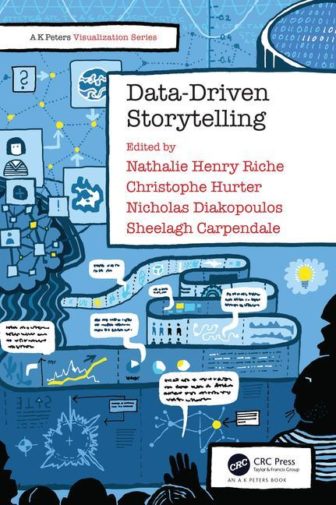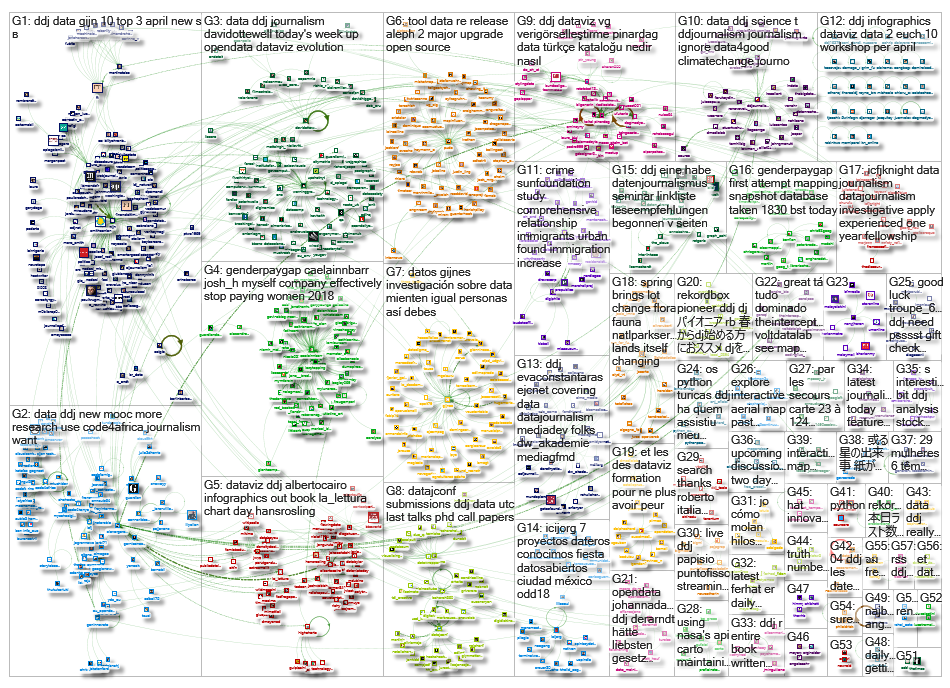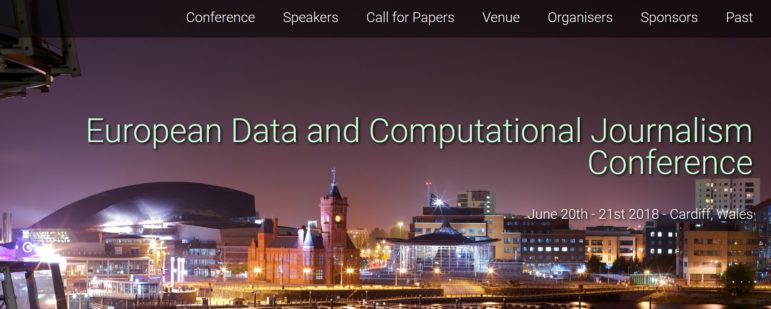 What’s the global data journalism community tweeting about this week? Our NodeXL #ddj mapping from April 2 to 8 finds an alarming piece by @iamdylancurran on how much data Facebook and Google have actually gleaned from us, @OCCRP‘s powerful database of public records and leaks, @davidottewell‘s take on the evolution of data journalism, and an investigation by @TheInterceptBr into the militias in Rio de Janeiro.
What’s the global data journalism community tweeting about this week? Our NodeXL #ddj mapping from April 2 to 8 finds an alarming piece by @iamdylancurran on how much data Facebook and Google have actually gleaned from us, @OCCRP‘s powerful database of public records and leaks, @davidottewell‘s take on the evolution of data journalism, and an investigation by @TheInterceptBr into the militias in Rio de Janeiro.
Personal Data Harvest
Want to freak yourself out? Data consultant and web developer Dylan Curran shows us just how much of our information the likes of Facebook and Google store about you without you even realizing it.
“We would never let the government or a corporation put cameras/microphones in our homes or location trackers on us. But we just went ahead and did it ourselves because – to hell with it! – I want to watch cute dog videos” @iamdylancurran https://t.co/sj9EdxBT93
— Brendan McDonald (@7piliers) March 31, 2018
OCCRP Data
As OCCRP’s co-founder Drew Sullivan boasted on Twitter, data.occrp.org is “the preferred tool for goddam steely eyed journo men and women everywhere.” The database has recently been updated with powerful search functions that can crawl through 104 million public records and leaks from 179 sources to help you find relevant connections for your investigation.
Okay, this is incredible: https://t.co/Ky9At3eTBu. Search leaks, dumps, contracts, procurement records, UN reports, archived media articles, legal entities all at once, from one dashboard. From Organized Crime & Corruption Reporting Project https://t.co/Ky9At3eTBu pic.twitter.com/5gBmRc6LdQ
— Joseph Cox (@josephfcox) April 3, 2018
The Evolution of Data Journalism
The founder and head of the Trinity Mirror Data Unit talks about how data journalism isn’t just about innovation anymore but about delivery: “Innovation is getting data journalism on a front-page. Delivery is getting it on the front page day after day. Innovation is building a snazzy interactive that allows readers to explore and understand an important issue. Delivery is doing that, and getting large numbers of people to actually use it; then building another one the next day, and another the day after that.”
Years of hyperlocal #datajournalism! > “The evolution of data journalism” by @davidottewell https://t.co/P5ypq8pYtQ #ddj
— Andrea Nelson Mauro (@nelsonmau) April 4, 2018
The Problem with Militias in Brazil
An investigation by The Intercept Brasil reveals that militias in Rio de Janeiro, made up of off-duty law enforcement officers, pose a far bigger problem than drug trafficking gangs.
Very important reporting here 👇 highlighting the dangerously fuzzy line between drug gangs & off-duty police in Brazil. Reveals that anonymous tip lines receive more calls about off-duty police than drug gangs. Bravo to @Cecillia & team @TheInterceptBr https://t.co/qCzm8LTNID
— Shannon Sims (@shannongsims) April 5, 2018
Brexit Britain: A Confused Electorate
A year before Britain is supposed to formally break away from its nearest neighbors in continental Europe, Bloomberg asked voters what they now think about the split. Their finding: “divisions have only hardened…”
Look at several #charts visualizing the divisions on #Brexit in the UK and how views have changed: https://t.co/vBZCqPfHbW #dataviz pic.twitter.com/IyjkzUTPmC
— AnyChart (@AnyChart) April 3, 2018
Why Science Can’t Ignore Data Journalism
Freelance journalist Frank Odenthal writes that communicating the findings of scientific research based on this era’s new and big sets of data is a challenge for today’s scientists and journalists alike.
How can #datajournalism help to bring groundbreaking scientific discoveries to broader audiences? Read this insightful post by Frank Odenthal https://t.co/yxYYQxxrOn @ddjournalism #climatechange #H2020 pic.twitter.com/8fs0PDV0LL
— DigitalSingleMarket (@DSMeu) April 5, 2018
What Bill Gates is Reading: Factfulness
The book Factfulness by the late statistician Hans Rosling and his children, Ola Rosling and Anna Rosling Rönnlund, is now available. Bill Gates highly recommends it.
This is one of the most educational books I’ve ever read: https://t.co/6b6qd1k5Zc pic.twitter.com/JUUgytq1BI
— Bill Gates (@BillGates) April 5, 2018
Data-Driven Storytelling Book
A new book about data visualization and data-driven storytelling, edited by Nathalie Henry Riche, Christophe Hurter, Nicholas Diakopoulos and Sheelagh Carpendale, is about to hit bookshelves. The book covers topics like data-driven storytelling techniques, communicating data to an audience and evaluating data-driven stories and storytelling tools.
This book by @ndiakopoulos et. al that @jschwabish writes about looks very interesting: https://t.co/cikfTynt7v #dataviz #infographics #ddj pic.twitter.com/5GozituPD4
— Alberto Cairo (@albertocairo) April 6, 2018
Happy Open Data Day, Mexico!
Here’s a roundup of how Mexico celebrated Open Data Day, with a list of data projects discussed and links to useful data resources.
7 proyectos dateros que conocimos en la fiesta de los #DatosAbiertos en Ciudad de México #ODD18https://t.co/tSUjZnlvQ3 #Dataviz #DDJ #PeriodismoDeDatos #OpenData pic.twitter.com/dprCZNQSrf
— SocialTIC (@socialtic) April 3, 2018
Computational Journalism Conference
The 2nd European Data and Computational Journalism Conference, to be held in Cardiff, Wales, from June 20 to 21, will bring together practitioners in the fields of journalism and news production and information, data, social and computer sciences, facilitating multidisciplinary discussions on these topics in order to advance research and practice.
Thanks, once again, to Marc Smith of Connected Action for gathering the links and graphing them.
For a look at Marc Smith’s mapping on #ddj on Twitter, check out this map.


